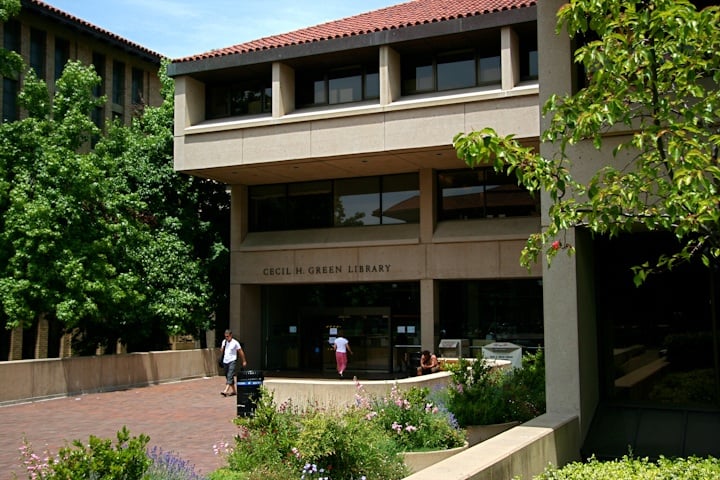Beginning in fall 2019, Stanford University Libraries plans to start transforming the first floor of Green Library’s East Wing into a space showcasing the innovation and entrepreneurs born from Silicon Valley. The space will be rechristened as Hohbach Hall in recognition of the Harold C. and Marilyn A. Hohbach Foundation, which gifted Stanford’s library system with $25 million for the project.
“Conversations around how we can improve the East Wing have been going on for a couple of years,” said Gabrielle Karampelas, who serves as the Director of Communications and Development at Stanford Libraries. “Although it’s newer than the Bing side of the building, it’s a core service center and we’re always looking at ways we can improve.”
According to Karampelas, Stanford Libraries had started a preliminary design review a couple of years ago before receiving the opportunity to meet the Hohbach family, who were interested in contributing to a project that would highlight the history of Silicon Valley. Specifically, Karampelas noted that Harold Hohbach, a Silicon Valley patent attorney and land developer whose wife and son are Stanford alumni, “really wanted to inspire the next generation of big thinkers.”
“[Hohbach] wanted people to be inspired from the past, to learn from the past, and was fond of the pioneers that helped establish what we now think of Silicon Valley,” she added. “We were fortunate to be able to present our Silicon Valley Archives to him, and before he passed, he was able to direct his family to grant a gift supporting both the renovations and the archives.”
The renovations will include the creation of active research spaces that can be used by faculty and students, more group study spaces and a classroom that will accommodate faculty-directed student engagement with archival materials. Such a classroom, Karampelas emphasized, will satisfy a “wave of popular demand” from faculty and students for spaces like the current Special Collections classroom where teaching draws from direct access to archival materials.
Current services offered on the first floor of Green Library’s East Wing, such as the the information and reference desk, the circulation desk and printing area will be integrated into the new Hohbach Hall.
As for the exhibition of the Silicon Valley Archives, Hohbach Hall will emulate spaces like the David Rumsey Map Center, where archival items are displayed on a rotating basis as collections designed for active visitor engagement.
Karampelas expressed a hope — shared by Mr. Hohbach — that the Hall would similarly engage students and visitors walking into the space, that “they might see something in the collection and think: ‘let me study that a little bit more.’”
“It’s kind of like [having] serendipity in the library, bringing special collections out so that people can have a different experience every time they walk in the library,” Karamplas said.
The Hohbach gift supports the exhibition of the Silicon Valley Archives in the new renovations, per Harold Hohbach’s wishes, but also specifically highlights the archives themselves, endowing them with perpetuity. The archives started as a library project in the mid-1980s and are composed of collections of primary documents from letters to blueprints to sketches created by prominent Silicon Valley figures. In the collection of this documentation, lead curator for the archives Henry Lowood said that Stanford was in “exactly the right place.”
“The first collections we received [that did not originate from Stanford] were the papers of Douglas Engelbart, best known for inventing the computer mouse, and the papers of the Varian Brothers,” recounted Lowood, who will also oversee the exhibition and inclusion of the archives in Hohbach Hall.
“The collections cover many areas of importance in the development of the Valley: the semiconductor industry, computing, entrepreneurship and venture capital, biotechnology and more,” he added.
Specifically, the archives also have nearly forty different collections relating to Apple alone, as well as the Frederick Terman Papers which are comprised of over 200 boxes of correspondence, reports and speeches from the man remembered by many as the “father of Silicon Valley.”
Lowood said he was able to speak with Hohbach before he passed in order to better understand Hohbach’s interests and intentions for the gift. He shared Hohbach’s opinion that studying Silicon Valley’s history will be crucial for the Stanford students who will be the driving force that moves the Valley forward.
“It was important to Harold that the drive and passion of entrepreneurially-minded students be encouraged and the accomplishments of the Silicon Valley inventors that came before not be forgotten,” Marilyn Hohbach told Stanford News.
According to Lowood, the Hohbach gift includes makes provisions for the library to increase programming centering on the collections and to offer a forum for discussion of Stanford’s relationship with the region, potentially through classes taught in the space, events, speakers or exhibits. Lowood will continue to oversee the archives, while visiting scholar Leslie Berlin will serve as the endowed position of Project Historian for the Silicon Valley Archives.
“I know of many students who have worked with one of our collections in a class and were inspired by that engagement to continue their attention to a topic or even reconsider their career choice,” Lowood said. “The challenge for us is then to build collections and programs in the Silicon Valley Archives that are interesting, relevant and perhaps inspirational for thinking about what we are doing today and will be doing tomorrow.”
Contact Sean Lee at seanklee ‘at’ stanford.edu.
